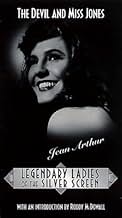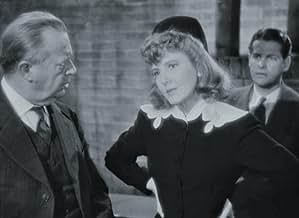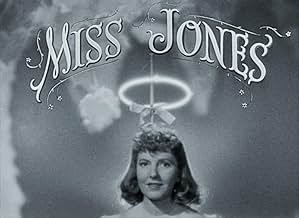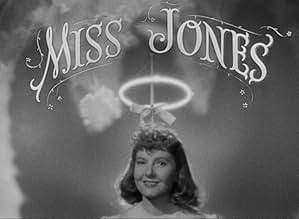AVALIAÇÃO DA IMDb
7,6/10
5 mil
SUA AVALIAÇÃO
Adicionar um enredo no seu idiomaA tycoon goes undercover to ferret out agitators at a department store, but gets involved in their lives instead.A tycoon goes undercover to ferret out agitators at a department store, but gets involved in their lives instead.A tycoon goes undercover to ferret out agitators at a department store, but gets involved in their lives instead.
- Indicado a 2 Oscars
- 3 vitórias e 2 indicações no total
S.Z. Sakall
- George
- (as S.Z. Sakall)
Avaliações em destaque
It's so full of good, common sense, compassion, wit and joy, that I can barely believe it. How depressing that this masterpiece should never be shown on TV (to my knowledge). It is not the first time that Norman Krasna has drawn my attention. This man is a genius. He writes with a total, unflagging self-assurance and perfection. This movie just cannot be improved upon. There are really no faults in it. The humor is funny without being demeaning, there is not the slightest mistake in taste or judgment. What makes it even more astonishing is that it was made during war time, when patriotism tends to cause people to become sentimental. This movie doesn't spare its country one whit. It does not include some "bad apples" among the workers. On the contrary, it implies that those who are usually referred to as bad apples are in fact the good ones! This movie is very much in the spirit of Frank Capra, and his rooting for the little man, but it outdoes Capra at his own game. There is more Capra in this movie than in all Capra movies put together. Krasna doesn't just root for the underdog, he fights his battles and he WINS! (1990 diary entry).
Ever since I saw Jean Arthur in "The More The Merrier", I fell in love with her. What beauty, what talent, what a VOICE!
This is one of her better films. More reminiscent of a Capra film. It's the working class vs the wealthy uncaring class. This goes beyond that though. It tells the tale of a rich man(Coburn) who hears of a revolt at one of his businesses. He wants it stopped and he wants heads to roll!!
When he thinks the investigation is not going to his liking, he decides to go undercover himself. Now this is where the REAL story starts. Now he is on THEIR ground and he sees for himself what these working class "pigs" are really like. They are just people. People with little money and big hearts, who just want a better life.
Everyone is wonderful in this film. Jean Arthur and Charles Coburn work terrific together as always(no wonder they did three movies together). I was surprised to see Robert Cummings in a major role back in 1941. I didn't know he was a star before Television.
The only real disappointment I had with this film was Edmund Gwenn. I could not believe it. The man that IS Santa Claus played a mean rude little man. EGAD!!
Seriously though, This is a MUST SEE for those who love good hearted comedies. Just makes you feel so good. An 8 out of 10.
This is one of her better films. More reminiscent of a Capra film. It's the working class vs the wealthy uncaring class. This goes beyond that though. It tells the tale of a rich man(Coburn) who hears of a revolt at one of his businesses. He wants it stopped and he wants heads to roll!!
When he thinks the investigation is not going to his liking, he decides to go undercover himself. Now this is where the REAL story starts. Now he is on THEIR ground and he sees for himself what these working class "pigs" are really like. They are just people. People with little money and big hearts, who just want a better life.
Everyone is wonderful in this film. Jean Arthur and Charles Coburn work terrific together as always(no wonder they did three movies together). I was surprised to see Robert Cummings in a major role back in 1941. I didn't know he was a star before Television.
The only real disappointment I had with this film was Edmund Gwenn. I could not believe it. The man that IS Santa Claus played a mean rude little man. EGAD!!
Seriously though, This is a MUST SEE for those who love good hearted comedies. Just makes you feel so good. An 8 out of 10.
10jotix100
Norman Krasna, was one of the best screen writers in the movies of the period. Sam Wood shows his ability to direct this excellent cast in one of the most satisfying comedies about the distinctions between the moneyed classes and the working stiffs they employed.
If you haven't seen the film, please stop reading now.
J.P. Merrick, is a millionaire who has investments all over New York. It is to his amazement he sees himself burned in effigy in front of the department store he has forgotten he owns. Merrick, like all people in business don't want to appear to be exploiting the workers, but this is too much! He must put an end to it.
In disguising himself as a salesman, he goes directly where the problem seems to be coming from, the shoe department. There he meets Mary Jones, who immediately feels Tom Higgins, his assumed name, is a man that is going through a rough time in his life. Mary feels pity when she realizes he doesn't know a thing about salesmanship.
In spite of everything going bad for him as a shoe salesman, Tom sticks to his new persona. He only meets kindness from all the people he is trying to fire. Merrick, by the end of the first full day at the store feels the strain of being on his feet all the time; we watch him soaking his feet in hot water, aided by his butler, George. In the process of gaining knowledge about the trouble makers, Merrick becomes human. He gets to realize how wrong he has been about a life he has lived so alienated from.
"The Devil and Miss Jones" is a movie that will delight anyone wishing to have fun. Of course, this is a film that depends totally in the two principals, Jean Arthur, who plays Mary Jones, and Charles Coburn, who as J.P Merrick/Tom Higgins shows why they were about the best actors working in the cinema in the 30s and 40s in Hollywood. Not only did they bring such class to whatever they played, but they are totally convincing. Ms. Arthur was a natural and so was Mr. Coburn.
The rest of the cast is extraordinary. A young Robert Cummings is perfect in his role as the union man. Spring Byinton, an actress that appeared in many films, is a charming Elizabeth, the woman that steals Merrick/Higgins heart. In her first scene with Mr. Coburn, she sits in the park bench to have lunch and he has nothing to eat. She gives him one of her tuna popovers and clarifies for him she paid 12 cents for the can! What times! In minor roles, S. Z. Sakall is George, the loyal butler. Mr. Sakall is a joy to watch, no matter what picture, or what character he is playing. Also, Edmund Gwenn, who probably stayed behind to played Santa Claus for the store, makes an incredible Hooper, the man in charge of the shoe department.
Thanks to Sam Wood's inspired direction this is a film that will not cease to please.
If you haven't seen the film, please stop reading now.
J.P. Merrick, is a millionaire who has investments all over New York. It is to his amazement he sees himself burned in effigy in front of the department store he has forgotten he owns. Merrick, like all people in business don't want to appear to be exploiting the workers, but this is too much! He must put an end to it.
In disguising himself as a salesman, he goes directly where the problem seems to be coming from, the shoe department. There he meets Mary Jones, who immediately feels Tom Higgins, his assumed name, is a man that is going through a rough time in his life. Mary feels pity when she realizes he doesn't know a thing about salesmanship.
In spite of everything going bad for him as a shoe salesman, Tom sticks to his new persona. He only meets kindness from all the people he is trying to fire. Merrick, by the end of the first full day at the store feels the strain of being on his feet all the time; we watch him soaking his feet in hot water, aided by his butler, George. In the process of gaining knowledge about the trouble makers, Merrick becomes human. He gets to realize how wrong he has been about a life he has lived so alienated from.
"The Devil and Miss Jones" is a movie that will delight anyone wishing to have fun. Of course, this is a film that depends totally in the two principals, Jean Arthur, who plays Mary Jones, and Charles Coburn, who as J.P Merrick/Tom Higgins shows why they were about the best actors working in the cinema in the 30s and 40s in Hollywood. Not only did they bring such class to whatever they played, but they are totally convincing. Ms. Arthur was a natural and so was Mr. Coburn.
The rest of the cast is extraordinary. A young Robert Cummings is perfect in his role as the union man. Spring Byinton, an actress that appeared in many films, is a charming Elizabeth, the woman that steals Merrick/Higgins heart. In her first scene with Mr. Coburn, she sits in the park bench to have lunch and he has nothing to eat. She gives him one of her tuna popovers and clarifies for him she paid 12 cents for the can! What times! In minor roles, S. Z. Sakall is George, the loyal butler. Mr. Sakall is a joy to watch, no matter what picture, or what character he is playing. Also, Edmund Gwenn, who probably stayed behind to played Santa Claus for the store, makes an incredible Hooper, the man in charge of the shoe department.
Thanks to Sam Wood's inspired direction this is a film that will not cease to please.
This is a wonderful story from the days immediately preceding America's entry into WWII, when the values that made America great were on display in the movies. A powerful department store owner, played by Charles Coburn, gets a job as a lowly clerk in his own store, in order to ferret out the workers who are trying to organize a labor union. He gradually gets caught up in the lives of the clerks in the shoe department (co-stars Jean Arthur, Bob Cummings, Spring Byington, Edmund Gwen) who accept him as just a poor, older man, and his view of things begins to shift. There are some excellent scenes in this movie, especially one in which Coburn is arrested while on a day at the beach with his fellow workers, and has to be kept out of jail by Cummings' bravado. Of course, everything works out well in the end, because this movie was made in the days when good was destined to triumph over evil.
Charles Coburn was a funny man. I wish had more movies with him in them, as he usually makes me laugh. He did here, and this movie was on it's way to a rating of "10" when it bogged down midway through and never really regained momentum. It did have a nice sentimental ending, though.
Coburn, meanwhile, was outstanding as the super-rich owner of a department store who goes "underground" as a shoe salesman in his store to find out the cause of worker unrest. Then romance takes over the story: Coburn and Spring Byington and then Bob Cummings and Jean Arthur and the story loses a lot of it comedy touch and its zip.
Overall, the film still exudes charm and Coburn, despite third billing, IS the star of this film. I'm sure a number of fans of this film are disappointed it still isn't out on DVD.
Coburn, meanwhile, was outstanding as the super-rich owner of a department store who goes "underground" as a shoe salesman in his store to find out the cause of worker unrest. Then romance takes over the story: Coburn and Spring Byington and then Bob Cummings and Jean Arthur and the story loses a lot of it comedy touch and its zip.
Overall, the film still exudes charm and Coburn, despite third billing, IS the star of this film. I'm sure a number of fans of this film are disappointed it still isn't out on DVD.
Você sabia?
- CuriosidadesJean Arthur planned to remake the picture with her as the devil titled "The Devil and Mr. Jones", but that project never materialized.
- Erros de gravaçãoDuring the beach scene, the people in the background change completely from shot to shot. However, the crowd in the opening shot of the beach scene is the same as the one in the final shot.
- Citações
First Policeman: When they start recitin' the Constitution, watch out!
- Cenas durante ou pós-créditosThe foreword after the opening credits reads: Dear Richest Men in the World: We made up this character in the story, out of our own heads. It's nobody, really. The whole thing is make-believe. We'd feel awful if anyone was offended. Thank you, The Author, Director and Producer. P.S. Nobody sue. P.P.S. Please.
- ConexõesFeatured in Ebert Presents: At the Movies: Episode #1.12 (2011)
- Trilhas sonorasThe Blue Danube Waltz, Opus 314
(1867) (uncredited)
Written by Johann Strauss
Played aboard ship at the end and danced by Merrick and the employees.
Principais escolhas
Faça login para avaliar e ver a lista de recomendações personalizadas
- How long is The Devil and Miss Jones?Fornecido pela Alexa
Detalhes
- Data de lançamento
- País de origem
- Idioma
- Também conhecido como
- The Devil and Miss Jones
- Locações de filme
- Empresa de produção
- Consulte mais créditos da empresa na IMDbPro
- Tempo de duração1 hora 32 minutos
- Cor
- Proporção
- 1.37 : 1
Contribua para esta página
Sugerir uma alteração ou adicionar conteúdo ausente

Principal brecha
By what name was O Diabo e a Mulher (1941) officially released in India in English?
Responda



































